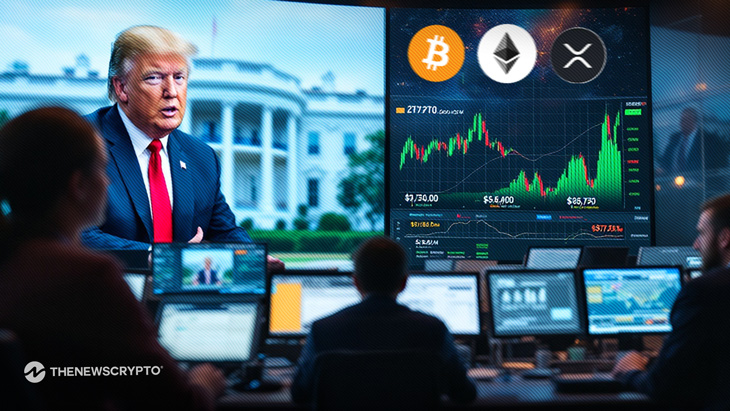The Impact of Political Events on Cryptocurrency Markets

- Elections create market volatility based on candidates’ crypto policies.
- Geopolitical tensions drive Bitcoin usage as a hedge against instability.
Cryptocurrency markets do not operate in isolation. Political events shape the economy, regulations, and investor sentiment. Government decisions can trigger price surges or steep declines. Elections, regulations, monetary policies, and geopolitical tensions all influence market behavior.
Elections and Cryptocurrency Volatility
Elections introduce uncertainty. Investors react to policy proposals from candidates. Market trends shift based on how policies could affect digital assets.
For example, the 2024 U.S. presidential election had a strong influence on Bitcoin’s price. Donald Trump’s pro-crypto stance reassured investors. His statements about making the U.S. a leader in blockchain technology created optimism. Institutional investors saw this as a positive sign. In contrast, Biden’s stricter regulatory approach led to market hesitancy. The uncertainty caused Bitcoin fluctuations before and after the election results.
Another example is India. In 2021, rumors spread that the government might ban private cryptocurrencies. Ahead of the elections, this uncertainty led to Bitcoin sell-offs among Indian investors. The market rebounded when the finance minister later clarified that crypto regulation was under consideration rather than a full ban.
Regulations and Market Reactions
Regulations play a crucial role in shaping cryptocurrency markets. Pro-crypto regulations often lead to price increases. Restrictive policies, however, drive investors away.
One key example is the U.S. Securities and Exchange Commission (SEC). The SEC’s lawsuits against major exchanges like Binance and Coinbase shook market confidence. Investors feared tighter regulatory actions would limit growth. Prices of Bitcoin, Ethereum, and altcoins dropped when the lawsuits were announced.
On the other hand, Hong Kong positioned itself as a global crypto hub. In 2023, the city introduced licensing frameworks to attract digital asset firms. The announcement led to increased trading activity. Investors saw it as a sign of mainstream acceptance, driving bullish momentum.
El Salvador also made headlines in 2021 by adopting Bitcoin as legal tender. The move was controversial. While international institutions criticized it, the announcement caused Bitcoin’s price to rise. The country also issued Bitcoin-backed bonds, further integrating crypto into its economy.
China, however, took the opposite stance. The government has banned cryptocurrency trading and mining multiple times. In 2021, the final crackdown forced miners to relocate. Bitcoin’s price dropped sharply, showing how regulatory actions impact the market.
Central Banks and Monetary Policies
Monetary policies influence cryptocurrency demand. When central banks tighten monetary policy, liquidity shrinks. This often leads to market corrections.
For example, in 2022, the Federal Reserve increased interest rates to combat inflation. The rate hikes made borrowing more expensive, reducing risk appetite. Investors moved away from volatile assets like Bitcoin. As a result, the crypto market experienced a prolonged bear phase.
Conversely, when the Federal Reserve signaled a pause in rate hikes in late 2023, Bitcoin rebounded. Traders anticipated a looser monetary policy, which would increase liquidity. This led to renewed buying interest in digital assets.
The European Central Bank (ECB) has also influenced the crypto market. In 2021, ECB President Christine Lagarde called for global regulations on Bitcoin. Her remarks led to market corrections. Institutional investors often react to such statements, adjusting their strategies accordingly.
Geopolitical Tensions and Market Movements
Geopolitical conflicts create financial uncertainty. During such times, investors seek safe-haven assets. Traditionally, gold played this role. However, Bitcoin has gained attention as a digital alternative.
The Russia- Ukraine war is a prime example. Following the invasion in 2022, economic sanctions restricted Russia’s access to global financial systems. As a result, Bitcoin trading volumes surged in Russia and Ukraine. People turned to crypto as an alternative to traditional banking.
Similarly, during the COVID-19 pandemic, global markets crashed. Investors feared economic instability. Bitcoin initially dropped along with stocks. However, as central banks introduced stimulus measures, Bitcoin recovered. Many saw it as a hedge against inflation, similar to gold.
Another example is Venezuela. Due to hyperinflation and political instability, citizens increasingly used Bitcoin. Many turned to crypto to preserve their wealth when the national currency lost value.
Institutional Adoption and Political Influence
Governments influence institutional participation in cryptocurrency. When regulators approve crypto-related financial products, institutional investors enter the market.
For instance, the approval of the U.S spot Bitcoin ETFs in 2024 attracted billions of dollars. BlackRock and Fidelity led the inflows, giving Bitcoin legitimacy among traditional investors.
In contrast, when regulatory uncertainty increases, institutions hesitate. The collapse of FTX in 2022 led to increased scrutiny. Many firms reduced crypto exposure due to fears of stricter regulations.
Pro-crypto policies also drive adoption. For example, the United Arab Emirates (UAE) established the Dubai Virtual Asset Regulatory Authority (VARA). This move attracted major crypto companies, boosting market confidence.
The Future of Cryptocurrency and Politics
The relationship between politics and cryptocurrency will continue evolving. Governments worldwide are drafting policies to regulate the industry. Clear guidelines could drive mainstream adoption. However, restrictive policies may limit growth.
Investors must monitor political events. Elections, regulations, monetary policies, and geopolitical developments all influence prices. By staying informed, traders can make better decisions and navigate market volatility. The crypto market remains dynamic. Political events will keep shaping its future.
Highlighted Crypto News Today
Bitcoin Whale Faces Coordinated Liquidation Effort Over $450M Short on Hyperliquid
Read More

U.S. Jobless Claims Align with Economic Forecasts
The Impact of Political Events on Cryptocurrency Markets

- Elections create market volatility based on candidates’ crypto policies.
- Geopolitical tensions drive Bitcoin usage as a hedge against instability.
Cryptocurrency markets do not operate in isolation. Political events shape the economy, regulations, and investor sentiment. Government decisions can trigger price surges or steep declines. Elections, regulations, monetary policies, and geopolitical tensions all influence market behavior.
Elections and Cryptocurrency Volatility
Elections introduce uncertainty. Investors react to policy proposals from candidates. Market trends shift based on how policies could affect digital assets.
For example, the 2024 U.S. presidential election had a strong influence on Bitcoin’s price. Donald Trump’s pro-crypto stance reassured investors. His statements about making the U.S. a leader in blockchain technology created optimism. Institutional investors saw this as a positive sign. In contrast, Biden’s stricter regulatory approach led to market hesitancy. The uncertainty caused Bitcoin fluctuations before and after the election results.
Another example is India. In 2021, rumors spread that the government might ban private cryptocurrencies. Ahead of the elections, this uncertainty led to Bitcoin sell-offs among Indian investors. The market rebounded when the finance minister later clarified that crypto regulation was under consideration rather than a full ban.
Regulations and Market Reactions
Regulations play a crucial role in shaping cryptocurrency markets. Pro-crypto regulations often lead to price increases. Restrictive policies, however, drive investors away.
One key example is the U.S. Securities and Exchange Commission (SEC). The SEC’s lawsuits against major exchanges like Binance and Coinbase shook market confidence. Investors feared tighter regulatory actions would limit growth. Prices of Bitcoin, Ethereum, and altcoins dropped when the lawsuits were announced.
On the other hand, Hong Kong positioned itself as a global crypto hub. In 2023, the city introduced licensing frameworks to attract digital asset firms. The announcement led to increased trading activity. Investors saw it as a sign of mainstream acceptance, driving bullish momentum.
El Salvador also made headlines in 2021 by adopting Bitcoin as legal tender. The move was controversial. While international institutions criticized it, the announcement caused Bitcoin’s price to rise. The country also issued Bitcoin-backed bonds, further integrating crypto into its economy.
China, however, took the opposite stance. The government has banned cryptocurrency trading and mining multiple times. In 2021, the final crackdown forced miners to relocate. Bitcoin’s price dropped sharply, showing how regulatory actions impact the market.
Central Banks and Monetary Policies
Monetary policies influence cryptocurrency demand. When central banks tighten monetary policy, liquidity shrinks. This often leads to market corrections.
For example, in 2022, the Federal Reserve increased interest rates to combat inflation. The rate hikes made borrowing more expensive, reducing risk appetite. Investors moved away from volatile assets like Bitcoin. As a result, the crypto market experienced a prolonged bear phase.
Conversely, when the Federal Reserve signaled a pause in rate hikes in late 2023, Bitcoin rebounded. Traders anticipated a looser monetary policy, which would increase liquidity. This led to renewed buying interest in digital assets.
The European Central Bank (ECB) has also influenced the crypto market. In 2021, ECB President Christine Lagarde called for global regulations on Bitcoin. Her remarks led to market corrections. Institutional investors often react to such statements, adjusting their strategies accordingly.
Geopolitical Tensions and Market Movements
Geopolitical conflicts create financial uncertainty. During such times, investors seek safe-haven assets. Traditionally, gold played this role. However, Bitcoin has gained attention as a digital alternative.
The Russia- Ukraine war is a prime example. Following the invasion in 2022, economic sanctions restricted Russia’s access to global financial systems. As a result, Bitcoin trading volumes surged in Russia and Ukraine. People turned to crypto as an alternative to traditional banking.
Similarly, during the COVID-19 pandemic, global markets crashed. Investors feared economic instability. Bitcoin initially dropped along with stocks. However, as central banks introduced stimulus measures, Bitcoin recovered. Many saw it as a hedge against inflation, similar to gold.
Another example is Venezuela. Due to hyperinflation and political instability, citizens increasingly used Bitcoin. Many turned to crypto to preserve their wealth when the national currency lost value.
Institutional Adoption and Political Influence
Governments influence institutional participation in cryptocurrency. When regulators approve crypto-related financial products, institutional investors enter the market.
For instance, the approval of the U.S spot Bitcoin ETFs in 2024 attracted billions of dollars. BlackRock and Fidelity led the inflows, giving Bitcoin legitimacy among traditional investors.
In contrast, when regulatory uncertainty increases, institutions hesitate. The collapse of FTX in 2022 led to increased scrutiny. Many firms reduced crypto exposure due to fears of stricter regulations.
Pro-crypto policies also drive adoption. For example, the United Arab Emirates (UAE) established the Dubai Virtual Asset Regulatory Authority (VARA). This move attracted major crypto companies, boosting market confidence.
The Future of Cryptocurrency and Politics
The relationship between politics and cryptocurrency will continue evolving. Governments worldwide are drafting policies to regulate the industry. Clear guidelines could drive mainstream adoption. However, restrictive policies may limit growth.
Investors must monitor political events. Elections, regulations, monetary policies, and geopolitical developments all influence prices. By staying informed, traders can make better decisions and navigate market volatility. The crypto market remains dynamic. Political events will keep shaping its future.
Highlighted Crypto News Today
Bitcoin Whale Faces Coordinated Liquidation Effort Over $450M Short on Hyperliquid
Read More

